31 have author last names that start with T have author last names that start with T
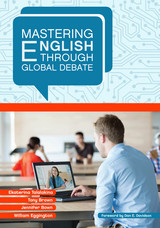
eTextbooks are now available through VitalSource.com!
Mastering English through Global Debate brings together rhetorical traditions and the best practices of ESL instruction to facilitate superior-level proficiency in the English language. Each chapter addresses a rich topic of debate, providing students with a set of prereading activities, texts covering both sides of a debate topic, and postreading comprehension and lexical development exercises—all of which foster the language and critical thinking skills needed for successful debates. A rhetorical methods section in each chapter integrates language and practice and prepares students for end-of-chapter debates. Using debate to develop advanced competency in a second language is a method that is finding increased interest among instructors and students alike, in both synchronous online teaching and the individual classroom. Students are prepared to participate fully in debates with their classmates—at home, abroad, or both.

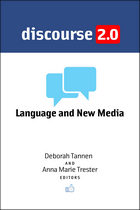
Our everyday lives are increasingly being lived through electronic media, which are changing our interactions and our communications in ways that we are only beginning to understand. In Discourse 2.0: Language and New Media, editors Deborah Tannen and Anna Marie Trester team up with top scholars in the field to shed light on the ways language is being used in, and shaped by, these new media contexts.
Topics explored include: how Web 2.0 can be conceptualized and theorized; the role of English on the worldwide web; how use of social media such as Facebook and texting shape communication with family and friends; electronic discourse and assessment in educational and other settings; multimodality and the "participatory spectacle" in Web 2.0; asynchronicity and turn-taking; ways that we engage with technology including reading on-screen and on paper; and how all of these processes interplay with meaning-making.
Students, professionals, and individuals will discover that Discourse 2.0 offers a rich source of insight into these new forms of discourse that are pervasive in our lives.

GURT is nationally and internationally recognized as one of the world's star gatherings for scholars in the fields of language and linguistics. In 2001, the best from around the world in the disciplines of anthropological linguistics and discourse analysis meet to present and share the latest research on linguistic analysis and to address real-world contexts in private and public domains. The result is this newest, invaluable 2001 edition of the Georgetown University Round Table on Languages and Linguistics. This volume brings together the plenary speakers only, all leaders in their fields, showcasing discourse contexts that range from medical interactions to political campaigns, from classroom discourse and educational policy to current affairs, and to the importance of everyday family conversations. The contributors expand the boundaries of discourse to include narrative theory, music and language, laughter in conversation, and the ventriloquizing of voices in dialogue.
Frederick Erickson explores the musical basis of language in an elementary school classroom; Wallace Chafe analyzes laughter in conversation. William Labov examines narratives told to South Africa's Truth and Reconciliation Commission, while Deborah Schiffrin compares multiple accounts of Holocaust narratives, and Alessandro Duranti considers competing speaker and audience interpretations during a political candidate's campaign tour. Robin Lakoff uncovers contrasting narratives shared by different cultural groups with respect to such current events as the O.J. Simpson trial. Deborah Tannen examines the integration of power and connection in family relationships, while Heidi Hamilton considers accounts that diabetic patients give their doctors. Shirley Brice Heath looks at discourse strategies used by policymakers to deny research findings, and G. Richard Tucker and Richard Donato report on a successful bilingual program.

This monumental two-volume publication brings together in the original languages and an English translation, all the decrees of all the ecumenical councils from Nicaea I to Vatican II. As such it represents an indispensable reference work for theologians and historians, as well as for anyone interested in the development of Christian thought and doctrine. Indeed, these decrees represent the authoritative distillation of Christian tradition which itself is bound together with scripture "in a close and reciprocal relationship" so that the two "form a single sacred deposit of the word of God, entrusted to the church."
The original text is a reproduction of the brilliant edition by G. Alberigo and others of the decrees Conciliorum Oecumenicorum Decreta, which provides for the first time a reliable critical text for all the ecumenical councils. The English translation faces each page of the original text and is the first rendering into English of all these decrees taken together. The translators have used inclusive language throughout to emphasize the continuity of conciliar documents.
The 2,528 total pages of these two volumes include all the authenticated texts and their English renderings as well as a preface and introduction by the oringinal languages editor, a foreword by the English language editor, a bibliography for each decree, various commentaries and explanatory notes, and ten comprehensive indices.
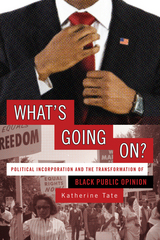
In political opinion surveys from the 1950s through the 1970s, African Americans were consistently among the most liberal groups in the United States and were much further to the left than White Americans on most issues. Starting in the 1980s, Black public opinion began to move to the center, and this trend has deepened since. Why is this the case?
Katherine Tate contends that Black political incorporation and increased affluence since the civil rights movement have made Black politics and public opinion more moderate over time. Black leaders now have greater opportunity to participate in mainstream politics, and Blacks look to elected officials rather than activists for political leadership. Black socioeconomic concerns have moved to the center as poverty has declined and their economic opportunities have improved.
Based on solid analysis of public opinion data from the 1970s to the present, Tate examines how Black opinions on welfare, affirmative action, crime control, school vouchers, civil rights for other minorities, immigration, the environment, and U.S. foreign policy have changed.

What, exactly, does it mean to be human? It is an age-old question, one for which theology, philosophy, science, and medicine have all provided different answers. But though a unified response to the question can no longer be taken for granted, how we answer it frames the wide range of different norms, principles, values, and intuitions that characterize today's bioethical discussions. If we don't know what it means to be human, how can we judge whether biomedical sciences threaten or enhance our humanity?
This fundamental question, however, receives little attention in the study of bioethics. In a field consumed with the promises and perils of new medical discoveries, emerging technologies, and unprecedented social change, current conversations about bioethics focus primarily on questions of harm and benefit, patient autonomy, and equality of health care distribution. Prevailing models of medical ethics emphasize human capacity for self-control and self-determination, rarely considering such inescapable dimensions of the human condition as disability, loss, and suffering, community and dignity, all of which make it difficult for us to be truly independent.
In Health and Human Flourishing, contributors from a wide range of disciplines mine the intersection of the secular and the religious, the medical and the moral, to unearth the ethical and clinical implications of these facets of human existence. Their aim is a richer bioethics, one that takes into account the roles of vulnerability, dignity, integrity, and relationality in human affliction as well as human thriving. Including an examination of how a theological anthropology—a theological understanding of what it means to be a human being—can help us better understand health care, social policy, and science, this thought-provoking anthology will inspire much-needed conversation among philosophers, theologians, and health care professionals.

Analyzing the Grammar of English offers a descriptive analysis of the indispensable elements of English grammar. Designed to be covered in one semester, this textbook starts from scratch and takes nothing for granted beyond a reading and speaking knowledge of English. Extensively revised to function better in skills-building classes, it includes more interspersed exercises that promptly test what is taught, simplified and clarified explanations, greatly expanded and more diverse activities, and a new glossary of over 200 technical terms.
Analyzing the Grammar of English is the only English grammar to view the sentence as a strictly punctuational construct—anything that begins with a capital letter and ends with a period, a question mark, an exclamation mark, or three dots—rather than a syntactic one, and to load, in consequence, all the necessary syntactic analysis onto the clause and its constituents.
It is also one of the very few English grammars to include—alongside multiple examples of canonical or "standard" language—occasional samples of stigmatized speech to illustrate grammar points.
Students and teachers in courses of English grammatical analysis, English teaching methods, TESOL methods, and developmental English will all benefit from this new edition.

Pronouncing English is a textbook for teaching English phonetics and phonology, offering an original "stress-based" approach while incorporating all the standard course topics. Drawing on current linguistic theory, it uniquely analyzes prosody first, and then discusses its effects on pronunciation—emphasizing suprasegmental features such as meter, stress, and intonation, then the vowels and consonants themselves.
Distinguished by being the first work of its kind to be based on an exhaustive statistical analysis of all the lexical entries of an entire dictionary, Pronouncing English is complemented by a list of symbols and a glossary. Richard Teschner and M. Stanley Whitley present an improved description of English pronunciation and conclude each chapter with suggestions on how to do a better job of teaching it. An appendix with a brief introduction to acoustic phonetics—the basis for the perception vs. the production of sounds—is also included. Revolutionary in its field, Pronouncing English declares that virtually all aspects of English pronunciation—from the vowel system to the articulation of syllables, words, and sentences—are determined by the presence or absence of stress.
The accompanying CD-ROM carries audio recordings of many of the volume's exercises, more than 100 text and sound files, and data files on which the statistical observations were based.

Prayer in public schools, abortion, gay and lesbian rights—these bitterly divisive issues dominate American politics today, revealing deep disagreements over basic moral values. In a highly readable account that draws on legal arguments, political theory, and philosophy, Ronald F. Thiemann explores the proper role of religious convictions in American public life. He proposes that religion can and should play an active, positive part in our society even as it maintains a fundamental commitment to pluralist, democratic values.
Arguing that both increased secularism and growing religious diversity since the 1960s have fragmented commonly held values, Thiemann observes that there has been an historical ambivalence in American attitudes towards religion in public life. He proposes abandoning the idea of an absolute wall between church and state and all the conceptual framework built around that concept in interpreting the first amendment. He returns instead to James Madison's views and the Constitutional principles of liberty, equality, and toleration. Refuting both political liberalism (as too secular) and communitarianism (as failing to meet the challenge of pluralism), Thiemann offers a new definition of liberalism that gives religions a voice in the public sphere as long as they heed the Constitutional principles of liberty, equality, and toleration or mutual respect.
The American republic, Thiemann notes, is a constantly evolving experiment in constructing a pluralistic society from its many particular communities. Religion can act as a positive force in its moral renewal, by helping to shape common cultural values.
All those interested in finding solutions to today's divisive political discord, in finding ways to disagree civilly in a democracy, and in exploring the extent to which religious convictions should shape the development of public policies will find that this book offers an important new direction for religion and the nation.

As corporations search for new production sites, governments compete furiously using location subsidies and tax incentives to lure them. Yet underwriting big business can have its costs: reduction in economic efficiency, shifting of tax burdens, worsening of economic inequalities, or environmental degradation.
Competing for Capital is one of the first books to analyze competition for investment in order to suggest ways of controlling the effects of capital mobility. Comparing the European Union's strict regulation of state aid to business with the virtually unregulated investment competition in the United States and Canada, Kenneth P. Thomas documents Europe's relative success in controlling—and decreasing—subsidies to business, even while they rise in the United States.
Thomas provides an extensive history of the powers granted to the EU's governing European Commission for controlling subsidies and draws on data to show that those efforts are paying off. In reviewing trends in North America, he offers the first comprehensive estimate of U.S. subsidies to business at all levels to show that the United States is a much higher subsidizer than it portrays itself as being.
Thomas then suggests what we might learn from the European experience to control the effects of capital mobility—not only within or between states, but also globally, within NAFTA and the World Trade Organization as well. He concludes with policy recommendations to help promote international cooperation and cross-fertilization of ways to control competition for investment.

This book illuminates issues in medical ethics revolving around the complex bond between healer and patient, focusing on friendship and other important values in the healing relationship. Embracing medicine, philosophy, theology, and bioethics, it considers whether bioethical issues in medicine, nursing, and dentistry can be examined from the perspective of the healing relationship rather than external moral principles.
Distinguished contributors explore the role of the health professional, the moral basis of health care, greater emphasis on the humanities in medical education, and some of the current challenges facing healers today.

On the Flathead Reservation in northwestern Montana, the sixty remaining fluent speakers of Montana Salish, most of them elderly, speak their language only to each other, changing to English when outsiders or younger tribal members are present. The Aleuts who used to live on Bering Island off the east coast of Russia speak Russian in addition to their native Aleut. The Republic of Singapore, an island nation of just 238 square miles, boasts four official languages. Language contact is everywhere: no nation has a completely monolingual citizenry and many have more than one official language.
Sarah G. Thomason documents the linguistic consequences of language contacts worldwide. Surveying situations in which language contact arises, she focuses on what happens to the languages themselves: sometimes nothing, sometimes the incorporation of new words, sometimes the spread of new sounds and sentence structures across many languages and wide swathes of territory. She outlines the origins and results of contact-induced language change, extreme language mixture—which can produce pidgins, creoles, and bilingual mixed languages—and language death. The book concludes with a brief survey of language endangerment.
Complete with lists of additional readings and references as well as a glossary for students new to the subject, this textbook is a richly documented introduction to a lively, fast-developing field.
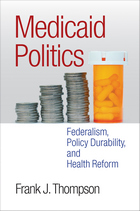
Medicaid, one of the largest federal programs in the United States, gives grants to states to provide health insurance for over 60 million low-income Americans. As private health insurance benefits have relentlessly eroded, the program has played an increasingly important role. Yet Medicaid’s prominence in the health care arena has come as a surprise.
Many astute observers of the Medicaid debate have long claimed that “a program for the poor is a poor program” prone to erosion because it serves a stigmatized, politically weak clientele. Means-tested programs for the poor are often politically unpopular, and there is pressure from fiscally conservative lawmakers to scale back the $350-billion-per-year program even as more and more Americans have come to rely on it. For their part, health reformers had long assumed that Medicaid would fade away as the country moved toward universal health insurance. Instead, Medicaid has proved remarkably durable, expanding and becoming a major pillar of America’s health insurance system.
In Medicaid Politics, political scientist Frank J. Thompson examines the program’s profound evolution during the presidential administrations of Bill Clinton, George W. Bush, and Barack Obama and its pivotal role in the epic health reform law of 2010. This clear and accessible book details the specific forces embedded in American federalism that contributed so much to Medicaid’s growth and durability during this period. It also looks to the future outlining the political dynamics that could yield major program retrenchment.

This comprehensive introduction to theories of religion is the first single-volume exploration of ideas put forward by both believers and non-believers.
James Thrower analyzes the different types of explanations of religion, not just the thoughts of individuals, advanced primarily—but not exclusively—from within the Western tradition. He begins by looking at religious explanations of religion, which define religion as revelation, experience or philosophy (Plato, Kant, and Hegel). He then examines the naturalist, or nonreligious, explanations, from the disciplines of anthropology, psychology, and sociology, including the "masters of suspicion" (including Feurbach, Nietzsche, Marx, Tylor, Frazer, and Freud). The scope of this book ranges from the classical, Semitic, and Indian religious traditions through contemporary thinkers.
Thrower concludes by considering the future of the religions of the world in light of the increasingly close inter-religious encounters that are becoming a feature of the global village of the twenty-first century.

By exploring a practical, rather than propositional, understanding of religious belief, this book provides a new construct through which to view philosophy of religion. Terrence W. Tilley shifts the focus of debate from the justification of rational belief to the exercise of wisdom in making or maintaining a commitment to religious practices. It is through practices, Tilley concludes, that religious belief is formed.
After analyzing the strengths and limitations of the modern approaches, Tilley applies the concept of wisdom to the process of making a religious commitment. Wisdom, as explored by Aristotle, St. Thomas Aquinas, and John Henry Newman, may be thought of as the bridge between intellectual and moral virtues. Roughly, it can be described as the ability to put intellect into action in a context. Because wisdom is a virtue requiring concrete display, the book discusses the wisdom of commitment to specific religious practices of a range of traditions. These examples demonstrate the issues and complexities involved in the wisdom of making a religious commitment. This important challenge to contemporary philosophy of religion will be of special interest to students and teachers of theology and philosophy of religion.

Statistics on the American family are sobering. From 1975 to 2000, one-third of all children were born to single mothers, and one-half of all marriages ended in divorce. While children from broken homes are two to three times more likely to develop behavioral and learning difficulties, two-parent families are not immune to problems. The cost of raising children has increased dramatically, and married couples with children are now twice as likely as childless couples to file for bankruptcy. Clearly, the American family is in trouble. But how this trouble started, and what should be done about it, remain hotly contested.
In a multifaceted analysis of the current state of a complex institution, Family Transformed brings together outstanding scholars from the fields of anthropology, demography, ethics, history, law, philosophy, primatology, psychology, sociology, and theology. Demonstrating that the family is both distinctive in its own right and deeply interwoven with other institutions, the authors examine the roles of education, work, leisure, consumption, legal regulation, public administration, and biology in shaping the ways we court and marry, bear and raise children, and make and break family bonds.
International in approach, this wide-ranging volume situates current American debates over sex, marriage, and family within a global framework. Weighing mounting social science evidence that supports a continued need for the nuclear family while assessing the challenges posed by new advocacy for same-sex marriage, and delegalized coupling, the authors argue that only by reintegrating the family into a just moral order of the larger community and society can we genuinely strengthen it. This means not simply upholding traditional family values but truly grasping the family's growing diversity, sustaining its coherence, and protecting its fragility for our own sake and for the common good of society.
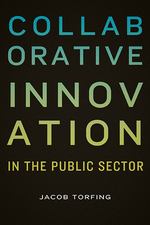
Governments worldwide struggle to remove policy deadlocks and enact much-needed reforms in organizational structure and public services. In this book, Jacob Torfing explores collaborative innovation as a way for public and private stakeholders to break the impasse. These network-based collaborations promise to multiply the skills, ideas, energy, and resources between government and its partners across agency boundaries and in the nonprofit and private sectors.
Torfing draws on his own pioneering work in Europe as well as examples from the United States and Australia to construct a cross-disciplinary framework for studying collaborative innovation. His analysis explores its complex and interactive processes as he looks at how drivers and barriers may enhance or impede the collaborative approach. He also reflects on the roles institutional design, public management, and governance reform play in spurring collaboration for public sector innovation. The result is a theoretically and empirically informed book that carefully demonstrates how multi-actor collaboration can enhance public innovation in the face of fiscal constraint, the proliferation of wicked problems, and the presence of unsatisfied social needs.

An original history of six generations of an African American family living in Washington, DC
Between Freedom and Equality begins with the life of Capt. George Pointer, an enslaved African who purchased his freedom in 1793 while working for George Washington’s Potomac Company. It follows the lives of six generations of his descendants as they lived and worked on the banks of the Potomac, in the port of Georgetown, and in a rural corner of the nation’s capital. By tracing the story of one family and their experiences, Between Freedom and Equality offers a moving and inspiring look at the challenges that free African Americans have faced in Washington, DC, since the district’s founding.
The story begins with an 1829 letter from Pointer that is preserved today in the National Archives. Inspired by Pointer’s letter, authors Barbara Boyle Torrey and Clara Myrick Green began researching this remarkable man who was a boat captain and supervisory engineer for the Potomac canal system. What they discovered about the lives of Pointer and his family provides unique insight across two centuries of Washington, DC, history.
The Pointer family faced many challenges—the fragility of freedom in a slaveholding society, racism, wars, floods, and epidemics—but their refuge was the small farm they purchased in what is now Chevy Chase. However, in the early twentieth century, the DC government used eminent domain to force the sale of their farm and replaced it with an all-white school. Between Freedom and Equality grants Pointer and his descendants their long-overdue place in American history.
This book includes a foreword by historian Maurice Jackson exploring the significance of the Pointer family’s unique history in the capital. In another very personal foreword, James Fisher, an eighth-generation descendant of George Pointer, shares his complex emotions when he learned about his ancestors. Also featured in this important history is a facsimile and transcription of George Pointer’s original letter and a family tree.
Royalties from the sale of the book will go to Historic Chevy Chase DC (HCCDC), which has established a fund for promoting the legacy of George Pointer and his descendants.

In this first comprehensive study of the problem of a universal definition of human rights, Robert Traer argues that contemporary theological discourse contains an affirmation of faith that unites members of world religious traditions with secular humanists in a common struggle to establish human rights as the basis for human dignity. Scholars of religion, law, and comparative religious ethics, as well as human rights advocates will find it an invaluable guide.
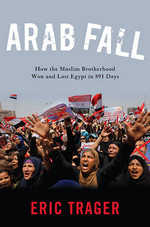
How did Egypt’s Muslim Brotherhood win power so quickly after the dramatic “Arab Spring” uprising that ended President Hosni Mubarak’s thirty-year reign in February 2011? And why did the Brotherhood fall from power even more quickly, culminating with the popular “rebellion” and military coup that toppled Egypt’s first elected president, Brotherhood leader Mohamed Morsi, in July 2013? In Arab Fall, Eric Trager examines the Brotherhood’s decision making throughout this critical period, explaining its reasons for joining the 2011 uprising, running for a majority of the seats in the 2011–2012 parliamentary elections, and nominating a presidential candidate despite its initial promise not to do so. Based on extensive research in Egypt and interviews with dozens of Brotherhood leaders and cadres including Morsi, Trager argues that the very organizational characteristics that helped the Brotherhood win power also contributed to its rapid downfall. The Brotherhood’s intensive process for recruiting members and its rigid nationwide command-chain meant that it possessed unparalleled mobilizing capabilities for winning the first post-Mubarak parliamentary and presidential elections.
Yet the Brotherhood’s hierarchical organizational culture, in which dissenters are banished and critics are viewed as enemies of Islam, bred exclusivism. This alienated many Egyptians, including many within Egypt’s state institutions. The Brotherhood’s insularity also prevented its leaders from recognizing how quickly the country was slipping from their grasp, leaving hundreds of thousands of Muslim Brothers entirely unprepared for the brutal crackdown that followed Morsi’s overthrow. Trager concludes with an assessment of the current state of Egyptian politics and examines the Brotherhood’s prospects for reemerging.

Heated debates over such issues as abortion, contraception, ordination, and Church hierarchy suggest that feminist and natural law ethics are diametrically opposed. Cristina L.H. Traina now reexamines both Roman Catholic natural law tradition and Anglo-American feminist ethics and reconciles the two positions by showing how some of their aims and assumptions complement one another.
After carefully scrutinizing Aquinas’s moral theology, she analyzes trends in both contemporary feminist ethics, theological as well as secular, and twentieth-century Roman Catholic moral theology. Although feminist ethics reject many of the methods and conclusions of the scholastic and revisionist natural law schools, Traina shows that a truly Thomistic natural law ethic nonetheless provides a much-needed holistic foundation for contemporary feminist ethics. On the other hand, she offers new perspectives on the writings of Josef Fuchs, Richard McCormick, and Gustavo Gutierrez, arguing that their failure to catch the full spirit of Thomas’s moral vision is due to inadequate attention to feminist critical methods.
This highly original book proposes an innovative union of two supposedly antagonistic schools of thought, a new feminist natural law that would yield more comprehensive moral analysis than either existing tradition alone. This is a provocative book not only for students of moral theology but also for feminists who may object to the very notion of natural law ethics, suggesting how each might find insight in an unlikely place.

Why do women go to war? Despite the reality that female combatants exist the world over, we still know relatively little about who these women are, what motivates them to take up arms, how they are utilized by armed groups, and what happens to them when war ends. This book uses three case studies to explore variation in women’s participation in nonstate armed groups in a range of contemporary political and social contexts: the civil war in Ukraine, the conflicts involving Kurdish groups in the Middle East, and the civil war in Colombia. In particular, the authors examine three important aspects of women’s participation in armed groups: mobilization, participation in combat, and conflict cessation. In doing so, they shed light on women’s pathways into and out of nonstate armed groups. They also address the implications of women’s participation in these conflicts for policy, including postconflict programming. This is an accessible and timely work that will be a useful introduction to another side of contemporary conflict.

Starting where Max Weber's The Protestant Ethic and the Spirit of Capitalism left off, John E. Tropman develops the idea that there is another religious-based ethic permeating society, a Catholic ethic. Where Weber proposed that a Protestant ethic supported the development of capitalism, Tropman argues that there is a Catholic ethic as well, and that it is more caring and community-oriented.
Weber's notion of the Protestant ethic has become widely accepted, but until Tropman's work, beginning in the mid-1980s, there had been no discussion of another, religious-based ethic. He suggests that if the Protestant ethic is an "achievement" ethic, the Catholic ethic is a "helping" one. Tropman outlines a Catholic ethic that is distinctive in its sympathy and outreach toward the poor, and in its emphasis on family and community over economic success. This book fully explores the Catholic ethic and its differing focus by using both historical and survey research. It also points to the existence of other religious-based ethics.
This clearly written book, employing the tools of both sociology and religious thought, will appeal to a wide audience, including students and scholars in disciplines informed by the influence of religion on politics and on social and economic behavior.

This selection of Peter Trudgill's major works since 1988, appearing here in updated and revised form, reveals major recurring themes in his work on linguistic diversity. This book evinces his deep concern that the world's linguistic diversity is diminishing at an alarming rate. The linguistic future is likely to be very different from the past, because increased language contact among peoples will result in the creation of fewer new languages to balance the language deaths. The essays here manifest Trudgill's conviction that linguists must make every effort to study minority languages and dialects before they vanish. The book also demonstrates his sense of the obligation that linguists have to educate the public about why linguistic diversity is valuable.
The book deals with a number of specific but related topics. One area is the role of English in the world, and the nature of Standard English or Englishes. Another is language as a human issue, reflecting the author's concern that the results of sociolinguistic research should be made available to assist, wherever possible, with the solution of educational and other real-world problems. A third focus is on the problematic and interconnected relationships among nation and language and dialect, but, unlike the work of most other writers in this field, this book looks closely at the linguistic characteristics of the varieties concerned. The final major emphasis is on sociohistorical linguistics: in particular, the relationship between colonial and motherland varieties of English; dialect contact and language contact; and the sociolinguistically informed dialectology of linguistic theory, linguistic description, and the applications of linguistics. The major overall unifying theme of the book is linguistic variation and, as the diachronic outcome of linguistic variation, linguistic change.
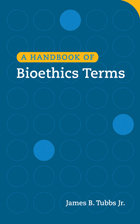
The term bioethics was first used in the early 1970s by biologists who were concerned about ethical implications of genetic and ecological interventions, but was soon applied to all aspects of biomedical ethics, including health care delivery, research, and public policy. Its literature draws from disciplines as varied as clinical medicine and nursing, scientific research, theology and philosophy, law, and the social sciences—each with its own distinctive vocabulary and expressions.
A Handbook of Bioethics Terms is a handy and concise glossary-style reference featuring over 400 entries on the significant terms, expressions, titles, and court cases that are most important to the field. Most entries are cross-referenced, making this handbook a valuable addition to the bookshelves of undergraduate and graduate students in health care ethics, physicians and nurses, members of institutional ethics committees and review boards, and others interested in bioethics.
A sampling of terms from the handbook: AbortionDNR (Do Not Resuscitate)Eugenics Gene therapy Living will Natural lawPrimum non nocere Single-payer systemSurrogate consent Schiavo case
Sample Definitions:
Formalism: In ethical theory, a type of deontology in which an action is judged to be right if it is in accord with a moral rule, and wrong if it violates a moral rule.
Xenograft: Organ or tissue transplanted from one individual to another individual of another species. (See Transplantation, organ and tissue)

The Annual, the journal of the Society of Christian Ethics, offers access to a wide variety of the most recent work in Christian and religious ethics. It is an essential source for student and faculty to keep abreast of new developments in the discipline and to locate sources for research.

The Annual, the journal of the Society of Christian Ethics, is an essential source for students and faculty to keep abreast of new developments in Christian and religious ethics and to locate sources for research. The Annual publishes nine to ten refereed scholarly articles a year as well as a professional resources section on teaching and scholarship in ethics. Subjects include the nature and tasks of religious ethics, comparative ethics involving a variety of Western and Eastern traditions, religious social ethics and social theory, and problems in professional and applied ethics.

The Annual, the journal of the Society of Christian Ethics, is an essential source for students and faculty to keep abreast of new developments in Christian and religious ethics and to locate sources for research. The Annual publishes nine to ten refereed scholarly articles a year as well as a professional resources section on teaching and scholarship in ethics. Subjects include the nature and tasks of religious ethics, comparative ethics involving a variety of Western and Eastern traditions, religious social ethics and social theory, and problems in professional and applied ethics.

Revised and updated edition of the perennial Georgetown University Press classic, Saints of the Liturgical Year, this beautiful and comfortably sized guide is compact, but brimming with information. This edition includes over 260 brief biographies, including 33 new entries, as well as a glossary of terms to help explain the theology of the Roman Catholic Church. Based on the General Roman Calendar, presently in use in the Roman Catholic Church, it also includes the feasts, Saints, and Blesseds from the Liturgical Calendar of the Society of Jesus—known as the Jesuits—as officially observed within the Society of Jesus.
Offering inspiration and encouragement, Saints and Feasts of the Liturgical Year functions as an aid in introducing the faithful to the day's feast or to the saint whose memorial is being celebrated. As a gift, for personal or group study, and helpful for introducing parishioners to the history of the church, this book can also be used as a source of ideas for all pastors.

Language in Use creatively brings together, for the first time, perspectives from cognitive linguistics, language acquisition, discourse analysis, and linguistic anthropology. The physical distance between nations and continents, and the boundaries between different theories and subfields within linguistics have made it difficult to recognize the possibilities of how research from each of these fields can challenge, inform, and enrich the others. This book aims to make those boundaries more transparent and encourages more collaborative research.
The unifying theme is studying how language is used in context and explores how language is shaped by the nature of human cognition and social-cultural activity. Language in Use examines language processing and first language learning and illuminates the insights that discourse and usage-based models provide in issues of second language learning. Using a diverse array of methodologies, it examines how speakers employ various discourse-level resources to structure interaction and create meaning. Finally, it addresses issues of language use and creation of social identity.
Unique in approach and wide-ranging in application, the contributions in this volume place emphasis on the analysis of actual discourse and the insights that analyses of such data bring to language learning as well as how language shapes and reflects social identity—making it an invaluable addition to the library of anyone interested in cutting-edge linguistics.
READERS
Browse our collection.
PUBLISHERS
See BiblioVault's publisher services.
STUDENT SERVICES
Files for college accessibility offices.
UChicago Accessibility Resources
home | accessibility | search | about | contact us
BiblioVault ® 2001 - 2024
The University of Chicago Press









